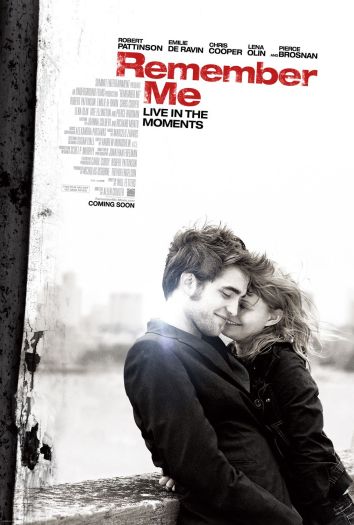Remember Me (2010)
/
Remember Me is a movie I did not expect to like based on my assumptions. But it surprised me even if there were many things I didn’t actually like. What’s great in the movie are the performances (especially Robert Pattinson, Emilie de Ravin, Ruby Jerin and most of all Pierce Brosnan), the characters and their relationships and… well, that’s it. The problem is that the plot is too constructed, one character is annoying as hell (Tate Ellington as the roommate Aidan) and the first and last ten minutes feel very contrived and unnecessary.
What probably rang so true to me were the parent-children relationships, at least for the most part. Tyler (Robert Pattinson) has a very troubled relationship to his father Charles (Pierce Brosnan). Charles is cold, distanced, doesn’t approve of Tyler’s life and thinks being a rich businessman is enough to provide for his family. Especially intriguing is the way he deals with his young daughter Caroline (Ruby Jerins, really really good) because, as Tyler points out, it seems he doesn’t like her. Now, consider, she is a bright, creative, funny girl (probably a bit idealized by the movie), but he basically can’t stand her. Not even in the “Oh man, girls are annoying”-ha ha kind of way but real dislike. You don’t see that very often in Hollywood movies although this happens much too often in real life. The movie also makes clear how devastating their father’s behaviour is to them. Caroline is sad, introverted and becomes the victim of bullying at school. Tyler becomes self-destructive, aggressive and aimless. Both reactions are very convincing psychologically and it is almost hard to watch. It’s a rare occasion that it feels like real human feelings, with all their flaws and all the terrible things parents can do to their children without being explicitly abusive. We so often see either perfectly happy relationships or pseudo-conflicts that are easily solved at the end of the movie. The problems here feel real and raw and devastating. One of my favourite scenes is when Tyler calls his father to ask him to have dinner with him. He is so angry with him but feels he has to make the call and you see all his conflicted feelings. Especially since there is no clear explanation for these conflicts. Sure, the oldest son committed suicide but it’s never spelled out that their father changed then or why the suicide happened. The movie does not attempt to explain everything and I really appreciate that.
The relationship between Ally (Emilie de Ravin) and her father (Chris Cooper) is similar. They seem to get along well since Ally’s mother was killed in front of her eyes (in the first scene that is too obviously played for shock and cry value). But even this relationship has clear cracks as becomes evident soon. The father drinks and becomes violent in one situation. After that Ally avoids him for a long time, as Tyler and his father also distance themselves from each other.
What bothers me so much is that in the end, everything points toward, well, not a happy ending because someone dies, but it is still played as if it’s inevitable that everyone will get along again eventually. That’s why I didn’t like the last ten minutes. Relationships to parents can be harmful and traumatic and sometimes it is better to distance yourself from them. As courageous as the movie is in its portrayal of distressing relationships that are symptomatic for our culture, it still shies away from that portrayal in the end. Still, I think it’s worth seeing the movie for everything else, even if the plot is annoying because it forces the characters to do things they don’t want to do to create false conflicts. But this doesn’t ruin the movie as much as the good scenes save the movie. And their message stands tall and true: parents can do horrible things to their children and they often do. I’ve seen that often enough and again, this must not be physical abusive behaviour to be terrible. It’s too bad the movie doesn’t trust this message and its own strengths until the end.
